This three-day conference will explore why the ongoing debt emergency remains unresolved, how it can…
IDEAs Conference: Development Strategies in an Uncertain and Unequal World List of Participants
Agostina Costantino
 Agostina Costantino is an adjunct researcher at the National Council for Scientific and Technical Research of Argentina and a lecturer at the National University of the South. She holds a degree in Economics (National University of the South, Argentina), a Master’s degree in Social Sciences (Latin American Faculty of Social Sciences, Mexico) and a PhD in Social Science Research (LAFSS, Mexico). Her research focuses on issues related to the problems of Latin American development from the perspective of Feminist Economics. Her lines of research have special emphasis on the gender biases of development models and the problems derived from the dispute over natural resources.
Agostina Costantino is an adjunct researcher at the National Council for Scientific and Technical Research of Argentina and a lecturer at the National University of the South. She holds a degree in Economics (National University of the South, Argentina), a Master’s degree in Social Sciences (Latin American Faculty of Social Sciences, Mexico) and a PhD in Social Science Research (LAFSS, Mexico). Her research focuses on issues related to the problems of Latin American development from the perspective of Feminist Economics. Her lines of research have special emphasis on the gender biases of development models and the problems derived from the dispute over natural resources.
Ahilan Kadirgamar
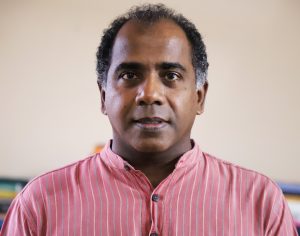 Ahilan Kadirgamar is Senior Lecturer, Department of Sociology, University of Jaffna, Sri Lanka. He holds a PhD in Anthropology from the Graduate Center, City University of New York, a MA in Economics from the New School for Social Research and a BS in Electrical Engineering from the Georgia Institute of Technology. He is a fortnightly columnist in the Daily Mirror, an Editorial Board Member of the Sri Lanka Journal of Social Sciences and a Board Member of Himal Southasian Magazine. His research interests include agrarian change, co-operatives and women’s livelihoods, and regularly writes on the political economy of Sri Lanka in forums such as The Hindu in India. He is currently the Honorary Chair of the Northern Co-operative Development Bank and a member of the Jaffna Peoples Forum for Co-existence. He served on the Central Bank of Sri Lanka appointed committee to draft the Economic Development Framework for a Northern Province Master Plan (August 2018).
Ahilan Kadirgamar is Senior Lecturer, Department of Sociology, University of Jaffna, Sri Lanka. He holds a PhD in Anthropology from the Graduate Center, City University of New York, a MA in Economics from the New School for Social Research and a BS in Electrical Engineering from the Georgia Institute of Technology. He is a fortnightly columnist in the Daily Mirror, an Editorial Board Member of the Sri Lanka Journal of Social Sciences and a Board Member of Himal Southasian Magazine. His research interests include agrarian change, co-operatives and women’s livelihoods, and regularly writes on the political economy of Sri Lanka in forums such as The Hindu in India. He is currently the Honorary Chair of the Northern Co-operative Development Bank and a member of the Jaffna Peoples Forum for Co-existence. He served on the Central Bank of Sri Lanka appointed committee to draft the Economic Development Framework for a Northern Province Master Plan (August 2018).
Alejandro Vanoli
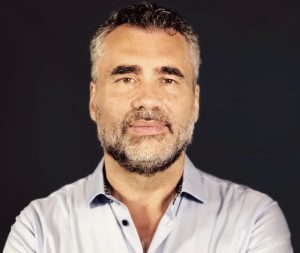 Alejandro Vanoli graduated as an economist from the University of Buenos Aires in 1987. He is currently the Chairman of Synthesis Argentina, a Financial and Economic Consultant, and a university professor. In 1988, he got into the Central Bank of Argentina through a merit-contest. For 27 years, he worked in different job positions inside the Central Bank, the Ministry of Economy, and the National Stock Exchange Commission of Argentina. Between November of 2009 and September of 2014, he carried out the presidency of the Argentinian Stock Exchange Commission. He worked as the Chairman of the Central Bank of Argentina between October of 2014 and December of 2015. From December of 2019 to April of 2020 he was the Executive Director of A.N.S.E.S. (National Administration of Social Security). Vanoli was an Associate Professor of International Finance 1 and 2 from 1998 to 2014. of the University of Buenos Aires (UBA) He was also an International Economy Associate of the Economic Science School (UBA) from 2001 to 2016. Since 2001, he performs as a member of the “Plan Fénix” (“Phoenix Plan”), a Strategic Project of Progressive Economists of the University of Buenos Aires.
Alejandro Vanoli graduated as an economist from the University of Buenos Aires in 1987. He is currently the Chairman of Synthesis Argentina, a Financial and Economic Consultant, and a university professor. In 1988, he got into the Central Bank of Argentina through a merit-contest. For 27 years, he worked in different job positions inside the Central Bank, the Ministry of Economy, and the National Stock Exchange Commission of Argentina. Between November of 2009 and September of 2014, he carried out the presidency of the Argentinian Stock Exchange Commission. He worked as the Chairman of the Central Bank of Argentina between October of 2014 and December of 2015. From December of 2019 to April of 2020 he was the Executive Director of A.N.S.E.S. (National Administration of Social Security). Vanoli was an Associate Professor of International Finance 1 and 2 from 1998 to 2014. of the University of Buenos Aires (UBA) He was also an International Economy Associate of the Economic Science School (UBA) from 2001 to 2016. Since 2001, he performs as a member of the “Plan Fénix” (“Phoenix Plan”), a Strategic Project of Progressive Economists of the University of Buenos Aires.
Alicia Puyana
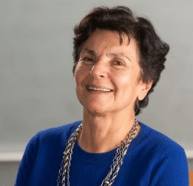 Alicia Puyana holds a DPhil degree in economics, Oxford University. She is full-time Professor of Economics at FLACSO-MEXICO, and is member of IDEAs, Oxford Development and other academic boards. She has been a visiting fellow at St Antony’s College, Oxford and London School of Economics. Puyana is author and editor of books and articles on economic growth, economic regional integration, oil economics and extractivism, growth and inequality, ethnic and gender discrimination in Latin America, and on the ethics in economics.
Alicia Puyana holds a DPhil degree in economics, Oxford University. She is full-time Professor of Economics at FLACSO-MEXICO, and is member of IDEAs, Oxford Development and other academic boards. She has been a visiting fellow at St Antony’s College, Oxford and London School of Economics. Puyana is author and editor of books and articles on economic growth, economic regional integration, oil economics and extractivism, growth and inequality, ethnic and gender discrimination in Latin America, and on the ethics in economics.
Ambika Subash
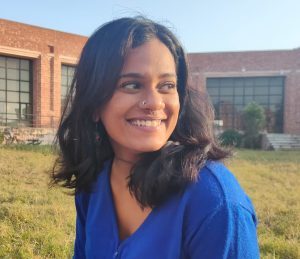 Ambika Subash is a Junior Research Fellow and doctoral student in Economics at the Centre for Economic Studies and Planning (CESP), Jawaharlal Nehru University. She also holds a Master’s in Economics from JNU and a Bachelor’s in Chemical Engineering from the National Institute of Technology, Calicut. Her doctoral research analyzes the interplay of technology, society and agriculture in the Global South. In the past, as a researcher at the Society for Social and Economic Research, New Delhi, she has worked on preparation of a Strategic Action Plan for Food Security, Rural and Agricultural Statistics (SAPFAS) for Somalia and on a project for monitoring of SDGs related to food and agriculture in India.
Ambika Subash is a Junior Research Fellow and doctoral student in Economics at the Centre for Economic Studies and Planning (CESP), Jawaharlal Nehru University. She also holds a Master’s in Economics from JNU and a Bachelor’s in Chemical Engineering from the National Institute of Technology, Calicut. Her doctoral research analyzes the interplay of technology, society and agriculture in the Global South. In the past, as a researcher at the Society for Social and Economic Research, New Delhi, she has worked on preparation of a Strategic Action Plan for Food Security, Rural and Agricultural Statistics (SAPFAS) for Somalia and on a project for monitoring of SDGs related to food and agriculture in India.
Andong Zhu
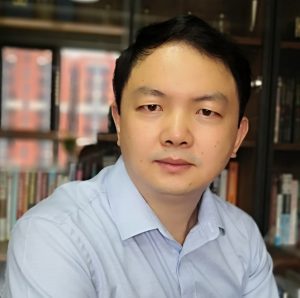 Zhu, Andong is Professor and Dean of the School of Marxism at the Tsinghua University. He got his Ph.D in Economics from the Department of Economics, Umass, Amherst. His research focus on Neoliberalism and the world economy, the systematic crisis of the world capitalism, The Chinese Economic development, and the economic role of State-owned Enterprises.
Zhu, Andong is Professor and Dean of the School of Marxism at the Tsinghua University. He got his Ph.D in Economics from the Department of Economics, Umass, Amherst. His research focus on Neoliberalism and the world economy, the systematic crisis of the world capitalism, The Chinese Economic development, and the economic role of State-owned Enterprises.
Andrés Arauz
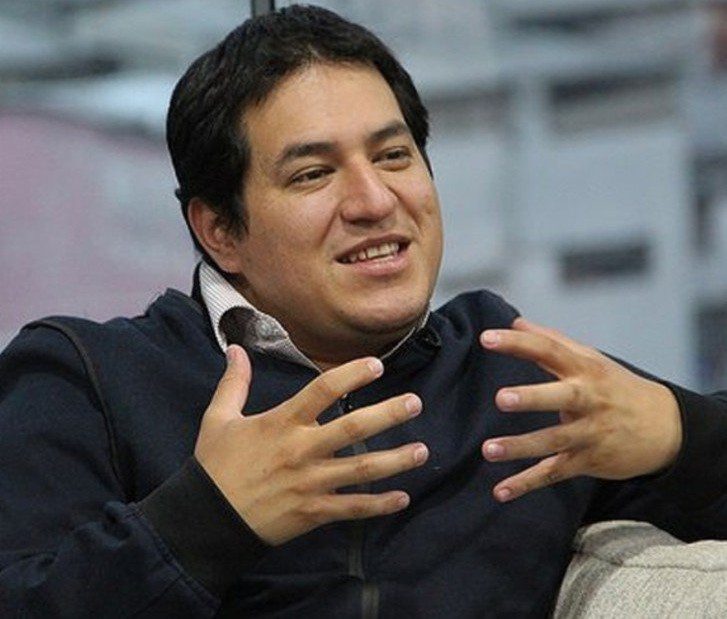 Dr. Andrés Arauz is an economist from Ecuador. He was general director of banking at the Central Bank from 2011 to 2013. He was Deputy Minister of planning and the Minister of Knowledge and Human Talent in the Rafael Correa government. In 2017, Arauz turned to an academic career, co-founding the Observatory of Dollarization dedicated to disseminating essays and investigations on the subject of dollarization of various national economies and its effects. He is a member of the Executive Council of the Progressive International. He was a candidate for the Presidency of Ecuador in the 2021 elections.
Dr. Andrés Arauz is an economist from Ecuador. He was general director of banking at the Central Bank from 2011 to 2013. He was Deputy Minister of planning and the Minister of Knowledge and Human Talent in the Rafael Correa government. In 2017, Arauz turned to an academic career, co-founding the Observatory of Dollarization dedicated to disseminating essays and investigations on the subject of dollarization of various national economies and its effects. He is a member of the Executive Council of the Progressive International. He was a candidate for the Presidency of Ecuador in the 2021 elections.
Antoinette Raquiza
 Antoinette R. Raquiza is Professor of Asian Studies and Philippine Development Studies at the Asian Center, University of the Philippines Diliman, and Convener of the Political Economy Program of the UP Center for Integrative and Development Studies as well as chairs the UP Diliman Task Force on a Blueprint for Building the Nation. She is also vice president of the Freedom from Debt Coalition, Manila-based think tank, Asia-Pacific Pathways for Progress Foundation, Inc. (APPFI), and chair of the regional academic network, Consortium for Southeast Asian Studies in Asia (SEASIA). Receiving her PhD in Political Science from the City University of New York Graduate Center, she specializes in comparative political institutions and political economy of late developing countries. Her work includes State Structure, Policy Formation, and Economic Development in Southeast Asia: The Political Economy of Thailand and the Philippines (Routledge).
Antoinette R. Raquiza is Professor of Asian Studies and Philippine Development Studies at the Asian Center, University of the Philippines Diliman, and Convener of the Political Economy Program of the UP Center for Integrative and Development Studies as well as chairs the UP Diliman Task Force on a Blueprint for Building the Nation. She is also vice president of the Freedom from Debt Coalition, Manila-based think tank, Asia-Pacific Pathways for Progress Foundation, Inc. (APPFI), and chair of the regional academic network, Consortium for Southeast Asian Studies in Asia (SEASIA). Receiving her PhD in Political Science from the City University of New York Graduate Center, she specializes in comparative political institutions and political economy of late developing countries. Her work includes State Structure, Policy Formation, and Economic Development in Southeast Asia: The Political Economy of Thailand and the Philippines (Routledge).
Asmaa Abumezied
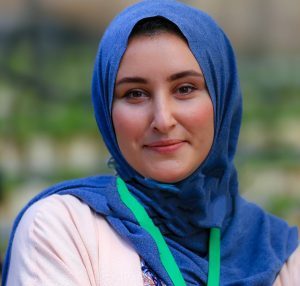 Asmaa AbuMezied is an economic development and gender expert working to address issues of gender, development, and climate change. She is also an economic development specialist and women inclusion advocate working with Oxfam’s economic justice program to address issues of gender, gendered economic policies, women economic empowerment in the agriculture sector, unpaid care and domestic work campaigning as well as intersection of gender issues with climate change. She is also currently on a secondment as a women economic justice advisor with Oxfam Great Britain. Her work and research interests are care economy, feminist economics, women collective organizing in the economy, inclusive markets , and the intersection of Palestinian political, agricultural, and environmental identities.
Asmaa AbuMezied is an economic development and gender expert working to address issues of gender, development, and climate change. She is also an economic development specialist and women inclusion advocate working with Oxfam’s economic justice program to address issues of gender, gendered economic policies, women economic empowerment in the agriculture sector, unpaid care and domestic work campaigning as well as intersection of gender issues with climate change. She is also currently on a secondment as a women economic justice advisor with Oxfam Great Britain. Her work and research interests are care economy, feminist economics, women collective organizing in the economy, inclusive markets , and the intersection of Palestinian political, agricultural, and environmental identities.
C P Chandrasekhar
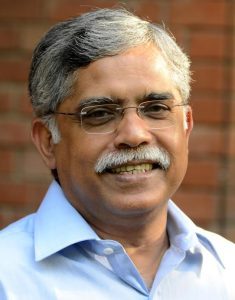 C.P. Chandrasekhar is an economist based in New Delhi and former Professor of Economics at Jawaharlal Nehru University. His areas of interest include the macroeconomics of development and the role of finance and industry in developing countries. He is a regular columnist for Frontline, Business Line, and the Economic and Political Weekly. Among his recent publications are two books titled Demonetisation Decoded: A Critique of India’s Currency Experiment (co-authored and published by Routledge) and Karl Marx’s Capital and the Present: Four Essays (Tulika Books).
C.P. Chandrasekhar is an economist based in New Delhi and former Professor of Economics at Jawaharlal Nehru University. His areas of interest include the macroeconomics of development and the role of finance and industry in developing countries. He is a regular columnist for Frontline, Business Line, and the Economic and Political Weekly. Among his recent publications are two books titled Demonetisation Decoded: A Critique of India’s Currency Experiment (co-authored and published by Routledge) and Karl Marx’s Capital and the Present: Four Essays (Tulika Books).
Charles A Abugre
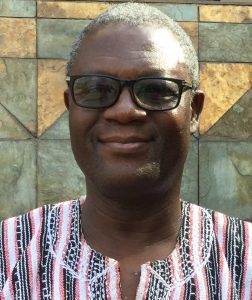 Charles A. Abugre is the current Executive Director of IDEAs. A Development Economist trained at the University of Ghana Legon and the Institute of Social Studies, The Netherlands, his research areas are in public finance, poverty and inequalities and natural resource governance. He has co-authored publications n international taxation and tax justice, African debt and development finance and is a regular contributor to the African Governance Report and the African Economic Report published by the UN Economic Commission for Africa (UNECA). He was previously a senior public servant with the Government of Ghana, a regional director for the UN Millennium Campaign (UNDP), head or research and policy at Christian Aid UK and lecturer at Swansea University, UK. He serves as a non-Executive Director of the Tax Justice Network among others.
Charles A. Abugre is the current Executive Director of IDEAs. A Development Economist trained at the University of Ghana Legon and the Institute of Social Studies, The Netherlands, his research areas are in public finance, poverty and inequalities and natural resource governance. He has co-authored publications n international taxation and tax justice, African debt and development finance and is a regular contributor to the African Governance Report and the African Economic Report published by the UN Economic Commission for Africa (UNECA). He was previously a senior public servant with the Government of Ghana, a regional director for the UN Millennium Campaign (UNDP), head or research and policy at Christian Aid UK and lecturer at Swansea University, UK. He serves as a non-Executive Director of the Tax Justice Network among others.
Dipa Sinha
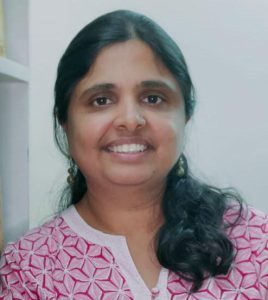 Dipa Sinha is currently Assistant Professor (Economics) at Dr. B. R. Ambedkar University Delhi. Her research is focussed on areas related to policy, gender, food security and public health. Over the last 15 years, she has worked with various policy research and advocacy organisations and has held advisory positions in non-government organisations. She worked with the Office of Commissioners to the Supreme Court (on the Right to Food), India. Dipa is actively involved with the Right to Food Campaign, India. Dipa holds an MA in Economics from Jawaharlal Nehru University (JNU), an MSc in Development Studies from School of Oriental and African Studies (SOAS), London, and a PhD from JNU
Dipa Sinha is currently Assistant Professor (Economics) at Dr. B. R. Ambedkar University Delhi. Her research is focussed on areas related to policy, gender, food security and public health. Over the last 15 years, she has worked with various policy research and advocacy organisations and has held advisory positions in non-government organisations. She worked with the Office of Commissioners to the Supreme Court (on the Right to Food), India. Dipa is actively involved with the Right to Food Campaign, India. Dipa holds an MA in Economics from Jawaharlal Nehru University (JNU), an MSc in Development Studies from School of Oriental and African Studies (SOAS), London, and a PhD from JNU
Dzodzi Tsikata
 Dzodzi Tsikata is Professor of Development Sociology and immediate past Director of the Institute of African Studies (IAS) at the University of Ghana. Her research in the last 30 years has been in the areas of gender and development policies and practices; agrarian change and rural livelihoods; the labour relations of the informal economy and transformative social policy. Her recent publications are the co-edited (with Elisabeth Prügl and Fenneke Reysoo) Forum in the Journal of Peasant Studies on the theme “Commercializing Agriculture/Reorganizing Gender” (JPS 48,7, September 2021). She is also the Principal Investigator of a pan-African research, networking and advocacy project, the Gender Equitable and Transformative Social Policy for Post-COVID-19 Africa (GETSPA) which is examining the social policy trajectories of thirty-one African countries. She is the secretary of the executive committee of IDEAS and a member of the Agrarian South Network.
Dzodzi Tsikata is Professor of Development Sociology and immediate past Director of the Institute of African Studies (IAS) at the University of Ghana. Her research in the last 30 years has been in the areas of gender and development policies and practices; agrarian change and rural livelihoods; the labour relations of the informal economy and transformative social policy. Her recent publications are the co-edited (with Elisabeth Prügl and Fenneke Reysoo) Forum in the Journal of Peasant Studies on the theme “Commercializing Agriculture/Reorganizing Gender” (JPS 48,7, September 2021). She is also the Principal Investigator of a pan-African research, networking and advocacy project, the Gender Equitable and Transformative Social Policy for Post-COVID-19 Africa (GETSPA) which is examining the social policy trajectories of thirty-one African countries. She is the secretary of the executive committee of IDEAS and a member of the Agrarian South Network.
Fachru Nofrain
 Fachru Nofrain is Professor of Economics at the Universitas Pembangunan Nasional Veteran, Jakarta. He studied at the University of Paris 1 (Centre d’économie de la Sorbonne, Maison des sciences économique, Sorbonne). His work areas include sustainable industrialization process, renewable energy, climate change, fiscal analysis, monetary and central bank analysis, international comparative industrialization studies, regional economic analysis including ASEAN+3, East Asia and South Asia, policy analysis, platform capitalism. He has worked in many national and international institutions such as Committee of National Economy and Industry, Central Bank Supervision Agency, the House of Representatives of the Republic of Indonesia, and Organization for Economic Collaboration and Development.
Fachru Nofrain is Professor of Economics at the Universitas Pembangunan Nasional Veteran, Jakarta. He studied at the University of Paris 1 (Centre d’économie de la Sorbonne, Maison des sciences économique, Sorbonne). His work areas include sustainable industrialization process, renewable energy, climate change, fiscal analysis, monetary and central bank analysis, international comparative industrialization studies, regional economic analysis including ASEAN+3, East Asia and South Asia, policy analysis, platform capitalism. He has worked in many national and international institutions such as Committee of National Economy and Industry, Central Bank Supervision Agency, the House of Representatives of the Republic of Indonesia, and Organization for Economic Collaboration and Development.
Florencia Pizzo
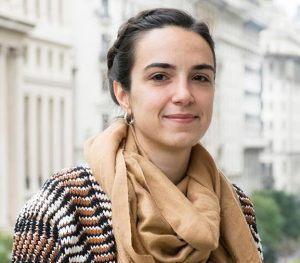 Florencia Pizzo is a Ph.D. scholar at the National University of San Martin (UNSAM) with a doctoral scholarship from the National Council for Scientific and Technical Research (CONICET) of Argentina. She holds a degree in Economics from the University of Buenos Aires (UBA) and has been a student of the M.A. in Development Economics at the UNSAM. She is a lecturer at the National University of Lanus (UNLA) and previously worked as a sectoral analyst in different national government departments of the Ministry of Economy, Ministry of Production and Ministry of Public Works. She has also been a consultant for international and national organizations such as IADB, CNCE, and INTA, among others. Her research interests are in development economics, particularly the links between productive structure, natural resources and innovation.
Florencia Pizzo is a Ph.D. scholar at the National University of San Martin (UNSAM) with a doctoral scholarship from the National Council for Scientific and Technical Research (CONICET) of Argentina. She holds a degree in Economics from the University of Buenos Aires (UBA) and has been a student of the M.A. in Development Economics at the UNSAM. She is a lecturer at the National University of Lanus (UNLA) and previously worked as a sectoral analyst in different national government departments of the Ministry of Economy, Ministry of Production and Ministry of Public Works. She has also been a consultant for international and national organizations such as IADB, CNCE, and INTA, among others. Her research interests are in development economics, particularly the links between productive structure, natural resources and innovation.
Gloria Afful-Mensah
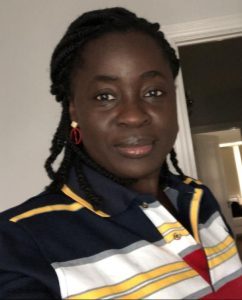 Gloria Afful-Mensah is currently a lecturer at the University of Ghana, Department of Economics; and a Research Associate with Agenda for International Development (A-id). She is an Economist by training, with a doctoral degree in economics from the University of Milan, Italy. She has interest in empirical microeconomics, and her past research has focused on maternal and child health. Currently, she has strong interest in economics of gender and development, particularly the welfare of women and children within the household framework. Gloria is open minded, loves to socialise and learn new things.utilization and health outcomes.
Gloria Afful-Mensah is currently a lecturer at the University of Ghana, Department of Economics; and a Research Associate with Agenda for International Development (A-id). She is an Economist by training, with a doctoral degree in economics from the University of Milan, Italy. She has interest in empirical microeconomics, and her past research has focused on maternal and child health. Currently, she has strong interest in economics of gender and development, particularly the welfare of women and children within the household framework. Gloria is open minded, loves to socialise and learn new things.utilization and health outcomes.
Jayati Ghosh
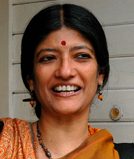 Jayati Ghosh taught economics at Jawaharlal Nehru University for nearly thirty-five years and is now Professor of Economics, University of Massachusetts, Amherst, USA. She has authored and edited (alone and in collaboration) 20 books and published more than 200 scholarly articles, in addition to writing frequently in the popular media. She has been Executive Secretary, IDEAs, and serves on a number of international commissions.
Jayati Ghosh taught economics at Jawaharlal Nehru University for nearly thirty-five years and is now Professor of Economics, University of Massachusetts, Amherst, USA. She has authored and edited (alone and in collaboration) 20 books and published more than 200 scholarly articles, in addition to writing frequently in the popular media. She has been Executive Secretary, IDEAs, and serves on a number of international commissions.
Jesim Pais
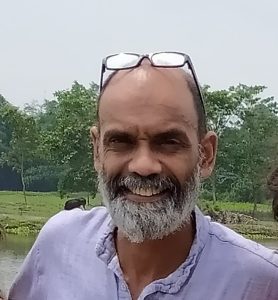 Jesim Pais is director of the Society for Social and Economic Research (SSER), an independent research institution based in Delhi, India. His main research interests have been in the area of informal sector and informal labour focusing on urban industrial centres in different parts of India. He has also worked on issues related to agrarian conditions and industrial development. He is also interested in training research scholars in methods of field-based research and quantitative analysis. Previously Jesim has worked at the Institute for Studies in Industrial Development, Delhi. and the Indian Statistical Institute, Kolkata. His PhD is from the Indira Gandhi Institute of Development Research (IGIDR), Mumbai. Jesim Pais has a graduate degree in Mechanical Engineering.
Jesim Pais is director of the Society for Social and Economic Research (SSER), an independent research institution based in Delhi, India. His main research interests have been in the area of informal sector and informal labour focusing on urban industrial centres in different parts of India. He has also worked on issues related to agrarian conditions and industrial development. He is also interested in training research scholars in methods of field-based research and quantitative analysis. Previously Jesim has worked at the Institute for Studies in Industrial Development, Delhi. and the Indian Statistical Institute, Kolkata. His PhD is from the Indira Gandhi Institute of Development Research (IGIDR), Mumbai. Jesim Pais has a graduate degree in Mechanical Engineering.
Jessica Vechbanyongratana
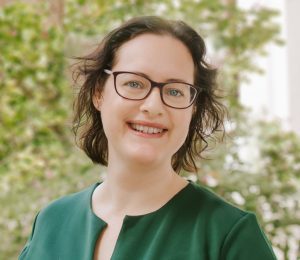 Dr. Jessica Vechbanyongratana is a Thai-American economist who is currently an assistant professor in the Faculty of Economics, Chulalongkorn University. Her research focuses on Thai labor markets (with special interests in gender, education, and informality) and Thai economic history. Jessica has published several articles in leading academic journals, including World Politics, Journal of Economic History, and Asian Development Review. She is co-editor of Economic History of Developing Regions and associate editor of Southeast Asian Journal of Economics.
Dr. Jessica Vechbanyongratana is a Thai-American economist who is currently an assistant professor in the Faculty of Economics, Chulalongkorn University. Her research focuses on Thai labor markets (with special interests in gender, education, and informality) and Thai economic history. Jessica has published several articles in leading academic journals, including World Politics, Journal of Economic History, and Asian Development Review. She is co-editor of Economic History of Developing Regions and associate editor of Southeast Asian Journal of Economics.
John Samuel
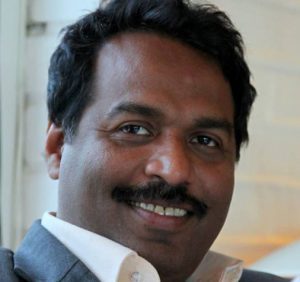 John is currently the Asia Regional Director of Oxfam International. John Samuel has around thirty years of experience and expertise in strengthening human rights, democratic governance, and sustainable development in India, the Asia-Pacific region, and globally. His work combined policy research, advocacy, capacity building, institution building, strategic leadership, and social mobilization across the world. He was the Director and Global Head of the UNDP Global Programme on Governance Assessments and the Global Democratic Governance Adviser at the UNDP. Prior to his role at the UNDP, he was the International Director of ActionAid International, heading the Asia-Pacific region and the global thematic work on just and democratic governance. John was instrumental in establishing the National Centre for Advocacy Studies (NCAS) in India and served as its Chief Executive and Executive Director until 2003. He was the founding Co-chair (2004 to 2007) of the Global Call to Action Against Poverty (GCAP). He was also the former CEO of Forum-Asia, the largest membership-based human rights and development organization working in 25 countries of the Asia-Pacific region.
John is currently the Asia Regional Director of Oxfam International. John Samuel has around thirty years of experience and expertise in strengthening human rights, democratic governance, and sustainable development in India, the Asia-Pacific region, and globally. His work combined policy research, advocacy, capacity building, institution building, strategic leadership, and social mobilization across the world. He was the Director and Global Head of the UNDP Global Programme on Governance Assessments and the Global Democratic Governance Adviser at the UNDP. Prior to his role at the UNDP, he was the International Director of ActionAid International, heading the Asia-Pacific region and the global thematic work on just and democratic governance. John was instrumental in establishing the National Centre for Advocacy Studies (NCAS) in India and served as its Chief Executive and Executive Director until 2003. He was the founding Co-chair (2004 to 2007) of the Global Call to Action Against Poverty (GCAP). He was also the former CEO of Forum-Asia, the largest membership-based human rights and development organization working in 25 countries of the Asia-Pacific region.
Jomo K S
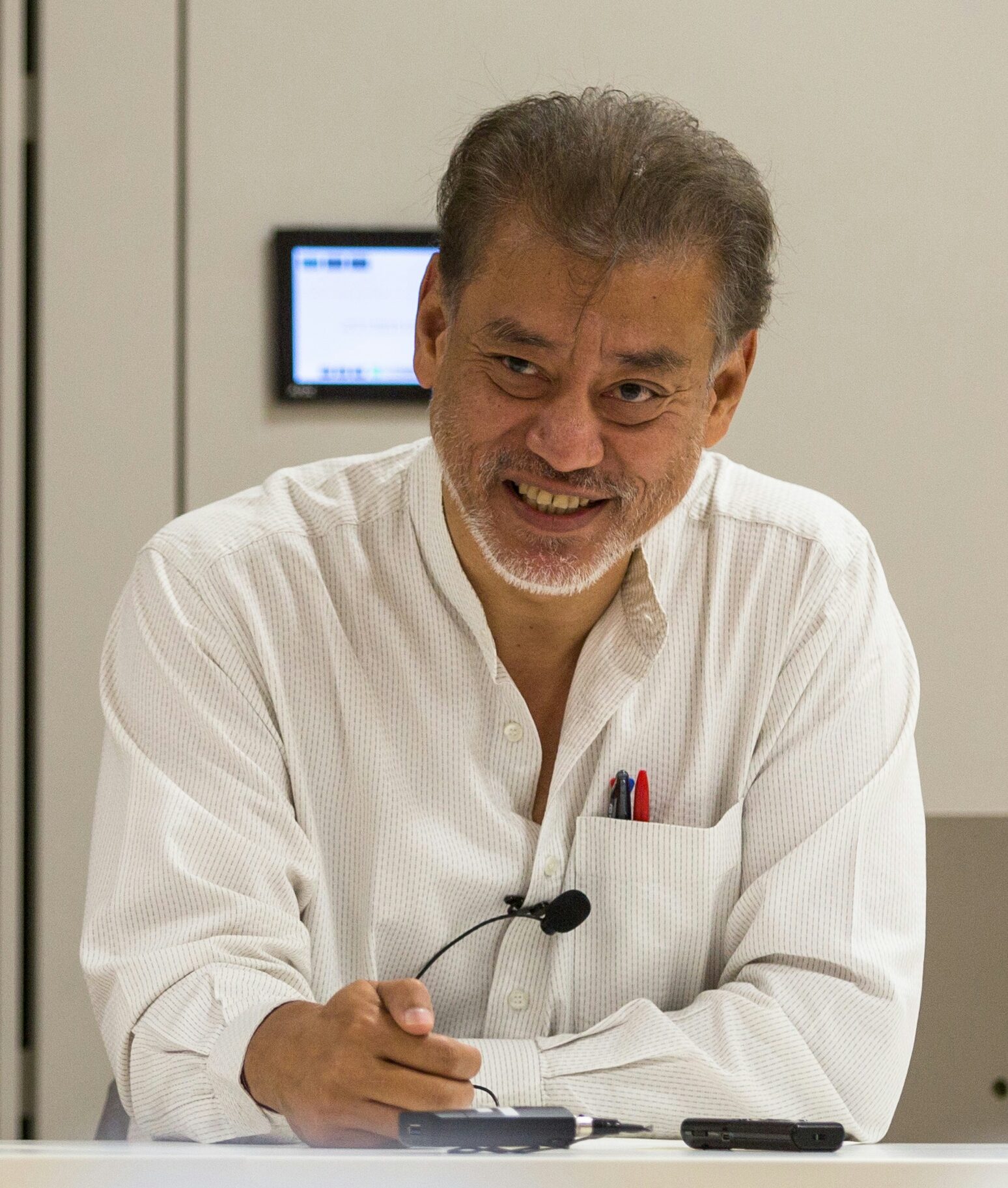 Jomo Kwame Sundaram is Senior Advisor at the Khazanah Research Institute, Fellow of the Academy of Science, Malaysia, and Emeritus Professor at the University of Malaya. He was the Founder-Chair of IDEAs. He was Assistant Director General and Coordinator for Economic and Social Development (ADG-ES), Food and Agriculture Organization of the United Nations from August 2012 until December 2015, Assistant Secretary General for Economic Development in the United Nations’ Department of Economic and Social Affairs (DESA) from January 2005 until June 2012, and (Honorary) Research Coordinator for the G24 Intergovernmental Group on International Monetary Affairs and Development from December 2006 until September 2012. In 2007, he was awarded the Wassily Leontief Prize for Advancing the Frontiers of Economic Thought. He has authored and edited over a hundred books and translated ten volumes besides writing many academic papers and articles for the media.
Jomo Kwame Sundaram is Senior Advisor at the Khazanah Research Institute, Fellow of the Academy of Science, Malaysia, and Emeritus Professor at the University of Malaya. He was the Founder-Chair of IDEAs. He was Assistant Director General and Coordinator for Economic and Social Development (ADG-ES), Food and Agriculture Organization of the United Nations from August 2012 until December 2015, Assistant Secretary General for Economic Development in the United Nations’ Department of Economic and Social Affairs (DESA) from January 2005 until June 2012, and (Honorary) Research Coordinator for the G24 Intergovernmental Group on International Monetary Affairs and Development from December 2006 until September 2012. In 2007, he was awarded the Wassily Leontief Prize for Advancing the Frontiers of Economic Thought. He has authored and edited over a hundred books and translated ten volumes besides writing many academic papers and articles for the media.
Jose Enrique A Africa
 Jose Enrique A. Africa is Executive Director of IBON Foundation – an independent NGO providing research, information and education services to people’s movements in the Philippines and abroad since 1978. He is a Board member of the alternative media outfit AlterMidya and civil society network Council for People’s Development and Governance (CPDG), a fellow of the Center for People Empowerment in Governance (CenPEG) and Center for Anti-Imperialist Studies (CAIS), and an editor of on-line news magazine Bulatlat. He previously worked in the national planning agency, as an evaluator of NGOs, legislative officer in Congress, and as a rural community organizer. He has been an active educator to people’s organizations as well as a resource person for schools, NGOs, government and media since the 1990s. He obtained his Master’s degree MSc in Development Studies and BSc in Philosophy and Economics from the London School of Economics and Political Science (LSE).
Jose Enrique A. Africa is Executive Director of IBON Foundation – an independent NGO providing research, information and education services to people’s movements in the Philippines and abroad since 1978. He is a Board member of the alternative media outfit AlterMidya and civil society network Council for People’s Development and Governance (CPDG), a fellow of the Center for People Empowerment in Governance (CenPEG) and Center for Anti-Imperialist Studies (CAIS), and an editor of on-line news magazine Bulatlat. He previously worked in the national planning agency, as an evaluator of NGOs, legislative officer in Congress, and as a rural community organizer. He has been an active educator to people’s organizations as well as a resource person for schools, NGOs, government and media since the 1990s. He obtained his Master’s degree MSc in Development Studies and BSc in Philosophy and Economics from the London School of Economics and Political Science (LSE).
Jose Romero
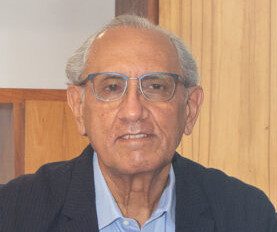 Jose Romero is currently General Director of the Center for Economic Research and Teaching, (CIDE). Before joining CIDE, he was a Research Professor attached to the Center for Economic Studies of the El Colegio de México. He is a member of the Mexican Academy of Sciences (2004) and a full member of the Mexican Academy of Political Economy (2015). His academic production is integrated by more than one hundred investigations published in journals, books, and book chapters both nationally and internationally. His areas of interest are Economic development, comparative economic history, and industrial and scientific policy. Among his most outstanding works is Developmental State: success stories and lessons for Mexico (2019) and The Limits to Mexico’s Economic Growth (2014). He has participated on the boards and editorial committees of journals and books of various national universities, and has taught more than 50 courses at the undergraduate and graduate levels at universities such as UNAM, CIDE, and El Colegio de México.
Jose Romero is currently General Director of the Center for Economic Research and Teaching, (CIDE). Before joining CIDE, he was a Research Professor attached to the Center for Economic Studies of the El Colegio de México. He is a member of the Mexican Academy of Sciences (2004) and a full member of the Mexican Academy of Political Economy (2015). His academic production is integrated by more than one hundred investigations published in journals, books, and book chapters both nationally and internationally. His areas of interest are Economic development, comparative economic history, and industrial and scientific policy. Among his most outstanding works is Developmental State: success stories and lessons for Mexico (2019) and The Limits to Mexico’s Economic Growth (2014). He has participated on the boards and editorial committees of journals and books of various national universities, and has taught more than 50 courses at the undergraduate and graduate levels at universities such as UNAM, CIDE, and El Colegio de México.
Kim Taekyoon
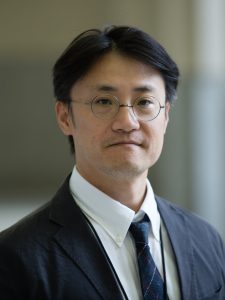 Kim Taekyoon is professor of international development at the Graduate School of International Studies (GSIS), Seoul National University (SNU). Prior to SNU, he was assistant professor of Ewha Womans University and Waseda University. He received a B.A. in Sociology and a M.A. in International Studies from SNU, a M.Phil in International Relations and a D.Phil in Social Policy from the University of Oxford, and a Ph.D. in International Relations from the Johns Hopkins School of Advanced International Studies (SAIS). He is currently working for the Korea International Cooperation Agency as an Executive Director, and has been appointed as a Board Member of the National Committee on Sustainable Development, the Committee for International Development Cooperation at the Prime Minister’s Office, the Policy Committee at the Ministry of Justice, etc. He also worked for UNESCO as a consultant, the UNRISD as collaborative researcher, the Woodrow Wilson International Center for Scholars as Fulbright fellow, and Tübingen University and University of Paris IV as visiting professors. His main research areas include international development, international political sociology, peace studies, global South studies, and global governance. He has published various scholarly journal articles and books.
Kim Taekyoon is professor of international development at the Graduate School of International Studies (GSIS), Seoul National University (SNU). Prior to SNU, he was assistant professor of Ewha Womans University and Waseda University. He received a B.A. in Sociology and a M.A. in International Studies from SNU, a M.Phil in International Relations and a D.Phil in Social Policy from the University of Oxford, and a Ph.D. in International Relations from the Johns Hopkins School of Advanced International Studies (SAIS). He is currently working for the Korea International Cooperation Agency as an Executive Director, and has been appointed as a Board Member of the National Committee on Sustainable Development, the Committee for International Development Cooperation at the Prime Minister’s Office, the Policy Committee at the Ministry of Justice, etc. He also worked for UNESCO as a consultant, the UNRISD as collaborative researcher, the Woodrow Wilson International Center for Scholars as Fulbright fellow, and Tübingen University and University of Paris IV as visiting professors. His main research areas include international development, international political sociology, peace studies, global South studies, and global governance. He has published various scholarly journal articles and books.
Muttaqa Yushau
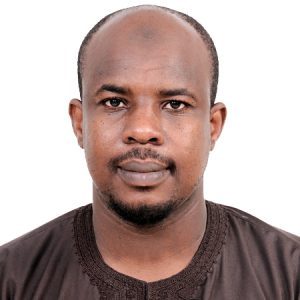 Muttaqa Yusha’u Abdulra’uf currently works as the head of education and training department of the Nigeria Labour Congress (NLC), Abuja Nigeria. He earned his PhD in social science and humanities from the Universiti of Teknologi Petronas, Malaysia. He is an Alumni of the Global Labour University, Masters programme on Labour Policies and Globalisation at the University of the Witwatersrand, South Africa. He was an inaugural fellow of the International Trade Union Confederation (ITUC) policy research on the alignment of IMF/World Bank policies on decent work and inequality at Washington Dc/ and New York. His area of research is on labour & development, Climate Change, and development policy finance.
Muttaqa Yusha’u Abdulra’uf currently works as the head of education and training department of the Nigeria Labour Congress (NLC), Abuja Nigeria. He earned his PhD in social science and humanities from the Universiti of Teknologi Petronas, Malaysia. He is an Alumni of the Global Labour University, Masters programme on Labour Policies and Globalisation at the University of the Witwatersrand, South Africa. He was an inaugural fellow of the International Trade Union Confederation (ITUC) policy research on the alignment of IMF/World Bank policies on decent work and inequality at Washington Dc/ and New York. His area of research is on labour & development, Climate Change, and development policy finance.
Ndongo Samba Sylla
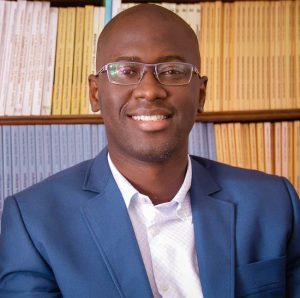 Ndongo Samba Sylla is a Senegalese development economist. He has previously worked as a technical advisor at the Presidency of the Republic of Senegal. He is currently a Senior Research and Program manager at the West Africa office of the Rosa Luxemburg Foundation (Dakar). His publications cover topics such as Fair trade, labor markets in developing countries, social movements, democratic theory, economic and monetary sovereignty. He authored The Fair Trade Scandal. Marketing Poverty to Benefit the Rich, Pluto Press & Ohio University Press, 2014. He coauthored Africa’s Last Colonial Currency. The CFA Franc Story, Pluto Press, 2021. He is a coeditor of Economic and Monetary Sovereignty for 21st century Africa (Pluto Press, 2021). He tweets at @nssylla
Ndongo Samba Sylla is a Senegalese development economist. He has previously worked as a technical advisor at the Presidency of the Republic of Senegal. He is currently a Senior Research and Program manager at the West Africa office of the Rosa Luxemburg Foundation (Dakar). His publications cover topics such as Fair trade, labor markets in developing countries, social movements, democratic theory, economic and monetary sovereignty. He authored The Fair Trade Scandal. Marketing Poverty to Benefit the Rich, Pluto Press & Ohio University Press, 2014. He coauthored Africa’s Last Colonial Currency. The CFA Franc Story, Pluto Press, 2021. He is a coeditor of Economic and Monetary Sovereignty for 21st century Africa (Pluto Press, 2021). He tweets at @nssylla
Neil Coleman
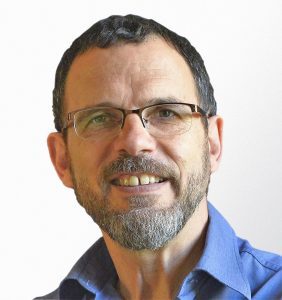 Neil Coleman is Co-Founder and Senior Policy Specialist at the Institute for Economic Justice (IEJ), a progressive economic policy and advocacy think tank launched in 2018, by a group of South African academics, activists and policy experts. He has led the Institute’s work on pioneering the introduction of Universal Basic Income Guarantee (UBIG) in South Africa- a matter which has now become the subject of a major national debate. A long time activist in the mass democratic movement, Neil worked for the Congress of South African Trade Unions (COSATU) from 1989-2017. From 1995-2007 he represented COSATU in the constitution making process, and in Parliament. From 2008-2017 he continued to work on various policy and strategy issues in his position as COSATU Strategies Coordinator. Neil has represented Labour in numerous fora, including various social dialogue and national political structures, and the National Economic Development and Labour Council (Nedlac); as well as several international fora, such as the ILO International Labour Conference, and International Council of the World Social Forum. In giving strategic policy advice to COSATU, he coordinated various teams of experts for the federation, including working with the country’s top progressive economists. From 2015-2017 he led the Labour delegation (the 3 Federations in Nedlac) in negotiating South Africa’s first National Minimum Wage. This was implemented in January 2019.
Neil Coleman is Co-Founder and Senior Policy Specialist at the Institute for Economic Justice (IEJ), a progressive economic policy and advocacy think tank launched in 2018, by a group of South African academics, activists and policy experts. He has led the Institute’s work on pioneering the introduction of Universal Basic Income Guarantee (UBIG) in South Africa- a matter which has now become the subject of a major national debate. A long time activist in the mass democratic movement, Neil worked for the Congress of South African Trade Unions (COSATU) from 1989-2017. From 1995-2007 he represented COSATU in the constitution making process, and in Parliament. From 2008-2017 he continued to work on various policy and strategy issues in his position as COSATU Strategies Coordinator. Neil has represented Labour in numerous fora, including various social dialogue and national political structures, and the National Economic Development and Labour Council (Nedlac); as well as several international fora, such as the ILO International Labour Conference, and International Council of the World Social Forum. In giving strategic policy advice to COSATU, he coordinated various teams of experts for the federation, including working with the country’s top progressive economists. From 2015-2017 he led the Labour delegation (the 3 Federations in Nedlac) in negotiating South Africa’s first National Minimum Wage. This was implemented in January 2019.
Noemi Levy
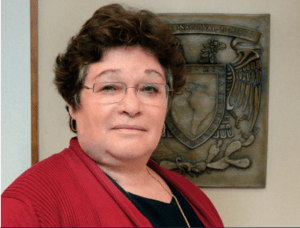 Noemi Levy She was born in Chile; has a B.A in Social Science (Economics), and her Master and PhD degree in Economics (National Autonomous University of Mexico, UNAM, Mexico), for which she got the cum-laude distinction and the Antonio Casso Medal (the best Economic Dissertation of Economics) for the PHD respectively. In 2014 she was given the “Premio Universidad Nacional 2014” in the field of Economics and Administration, which is the highest recognition that UNAM gives to professor, she is a Member (numeral 77) of the Mexican Academy of Political Economy (2015), and was presented with the Recognition Sor Juan Ines de la Cruz (2019) for women professor trajectory. She is a full-time professor in the Economic Faculty, UNAM, and has highest qualification in her academic performance (PRIDE, level “D”), and she is member of the Mexican National Research System (SNI, level III –highest level). Her area of academic interest in the economic field is Monetary Finance and Economic Development, with emphasis in the Heterodox economic theory. She has written three books (one in co-authorship) and edited more than 16 books (including international publishers – Edward Elgar and Routledge), written more than 40 chapters in book, and around 30 journal papers.
Noemi Levy She was born in Chile; has a B.A in Social Science (Economics), and her Master and PhD degree in Economics (National Autonomous University of Mexico, UNAM, Mexico), for which she got the cum-laude distinction and the Antonio Casso Medal (the best Economic Dissertation of Economics) for the PHD respectively. In 2014 she was given the “Premio Universidad Nacional 2014” in the field of Economics and Administration, which is the highest recognition that UNAM gives to professor, she is a Member (numeral 77) of the Mexican Academy of Political Economy (2015), and was presented with the Recognition Sor Juan Ines de la Cruz (2019) for women professor trajectory. She is a full-time professor in the Economic Faculty, UNAM, and has highest qualification in her academic performance (PRIDE, level “D”), and she is member of the Mexican National Research System (SNI, level III –highest level). Her area of academic interest in the economic field is Monetary Finance and Economic Development, with emphasis in the Heterodox economic theory. She has written three books (one in co-authorship) and edited more than 16 books (including international publishers – Edward Elgar and Routledge), written more than 40 chapters in book, and around 30 journal papers.
Oscar Ugarteche
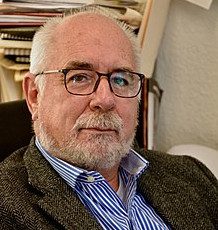 Oscar Ugarteche is a Peruvian economist and is a Professor at the Instituto de Investigaciones Económicas de la Universidad Nacional Autónoma de México (UNAM). He studied at the Pontificia Universidad Católica del Perú, Fordham University (New York), and London Business School, and did his Ph.D. from the University of Bergen, Norway. He has been visiting professor at the St Antony’s College (Oxford), the Center for Development Studies (Bergen), the Institute for Latin American Studies, University of London, the Center for Latin American Studies of the Free University of Berlin, and the Center for Latin American Studies at the University of Newcastle. In December 2015, he received an Honorary Doctorate from the National University of San Agustín in Arequipa, Peru, for his contribution to the knowledge of international economics.
Oscar Ugarteche is a Peruvian economist and is a Professor at the Instituto de Investigaciones Económicas de la Universidad Nacional Autónoma de México (UNAM). He studied at the Pontificia Universidad Católica del Perú, Fordham University (New York), and London Business School, and did his Ph.D. from the University of Bergen, Norway. He has been visiting professor at the St Antony’s College (Oxford), the Center for Development Studies (Bergen), the Institute for Latin American Studies, University of London, the Center for Latin American Studies of the Free University of Berlin, and the Center for Latin American Studies at the University of Newcastle. In December 2015, he received an Honorary Doctorate from the National University of San Agustín in Arequipa, Peru, for his contribution to the knowledge of international economics.
Pablo Bortz
 Pablo G. Bortz is co-director of the M.A. in Development Economics at the National University of San Martin, Professor at the National University of the West and Tenured Researcher at the National Council of Sciences and Technology (CONICET), in Argentina. He previously worked at UNCTAD, and in the Ministry of Finance, the Ministry of Foreign Affairs and the Central Bank in Argentina. He obtained his Ph.D. at the Delft University of Technology. He published in journals such as Development and Change, Review of Keynesian Economics, International Journal of Economic Policies and European Journal of Economics and Economic Policies, among others. He is the author of Inequality, Growth and “Hot Money” (Edward Elgar).
Pablo G. Bortz is co-director of the M.A. in Development Economics at the National University of San Martin, Professor at the National University of the West and Tenured Researcher at the National Council of Sciences and Technology (CONICET), in Argentina. He previously worked at UNCTAD, and in the Ministry of Finance, the Ministry of Foreign Affairs and the Central Bank in Argentina. He obtained his Ph.D. at the Delft University of Technology. He published in journals such as Development and Change, Review of Keynesian Economics, International Journal of Economic Policies and European Journal of Economics and Economic Policies, among others. He is the author of Inequality, Growth and “Hot Money” (Edward Elgar).
Pali Lehohla
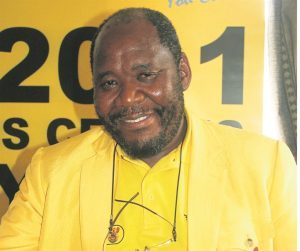 Pali Lehohla is the former Statistician-General of South Africa, a position he held from 2000 up to 2017. He was co-chair of PARIS21 and the Chair of the United Nations Statistics Commission. He was the founding chair of the Statistics Commission of Africa (StatCom Africa) and chaired the African Symposium for Statistical Development (ASSD). He was the Vice President of the International Statistics Institute (ISI). He served as one of the twenty-five-member panel on Data Revolution appointed by the UN Secretary General. Dr Lehohla has been a forceful advocate for improving the Civil Registration and Vital Statistics systems in Africa. He consulted extensively in the in conflict, out of conflict and fragile states on matters statistics. Since 2018 he became a Research Associate at Oxford University. For twenty years to date he has been a weekly columnist in the Business Report, over a month to-date he is a weekly columnist in the Sunday Times Daily Online. Dr Lehohla is the co-director of the Economic Modelling Academy (EMA) that aims to train society in economic policy formulation based on the principles and laws of motion of economics.
Pali Lehohla is the former Statistician-General of South Africa, a position he held from 2000 up to 2017. He was co-chair of PARIS21 and the Chair of the United Nations Statistics Commission. He was the founding chair of the Statistics Commission of Africa (StatCom Africa) and chaired the African Symposium for Statistical Development (ASSD). He was the Vice President of the International Statistics Institute (ISI). He served as one of the twenty-five-member panel on Data Revolution appointed by the UN Secretary General. Dr Lehohla has been a forceful advocate for improving the Civil Registration and Vital Statistics systems in Africa. He consulted extensively in the in conflict, out of conflict and fragile states on matters statistics. Since 2018 he became a Research Associate at Oxford University. For twenty years to date he has been a weekly columnist in the Business Report, over a month to-date he is a weekly columnist in the Sunday Times Daily Online. Dr Lehohla is the co-director of the Economic Modelling Academy (EMA) that aims to train society in economic policy formulation based on the principles and laws of motion of economics.
Prabhat Patnaik
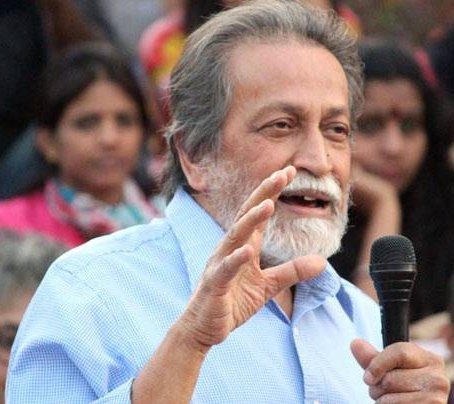 Prabhat Patnaik has taught at the University of Cambridge, UK, and at the Jawaharlal Nehru University, New Delhi, where he held the Sukhamoy Chakravarty Chair at the time of his retirement, and is currently Professor Emeritus. His books include Accumulation and Stability Under Capitalism (1997), The Value of Money (2009), Re-envisioning Socialism (2011) and A Theory of Imperialism (co-authored with Utsa Patnaik, 2016). His book (co-authored with Utsa Patnaik) Capital and Imperialism: Theory, History, and the Present (2021) is winner of the Paul A. Baran-Paul M. Sweezy Memorial Award. He is the editor of the journal Social Scientist.
Prabhat Patnaik has taught at the University of Cambridge, UK, and at the Jawaharlal Nehru University, New Delhi, where he held the Sukhamoy Chakravarty Chair at the time of his retirement, and is currently Professor Emeritus. His books include Accumulation and Stability Under Capitalism (1997), The Value of Money (2009), Re-envisioning Socialism (2011) and A Theory of Imperialism (co-authored with Utsa Patnaik, 2016). His book (co-authored with Utsa Patnaik) Capital and Imperialism: Theory, History, and the Present (2021) is winner of the Paul A. Baran-Paul M. Sweezy Memorial Award. He is the editor of the journal Social Scientist.
Rashed Al Mahmud Titumir
 Rashed Al Mahmud Titumir is a Professor of Economics at the Department of Development Studies of the University of Dhaka, Bangladesh. He is currently holding the charge of the Chairman of the Department. His latest books are: Fiscal and Monetary Policies in Developing Countries: State, Citizenship and Transformation (Routledge); State Building and Social Policies in Developing Countries: The Political Economy of Development (Routledge); Numbers and Narratives in Bangladesh’s Economic Development (Palgrave Macmillan); COVID-19 and Bangladesh: Response, Rights & Resilience (University Press Ltd); Sundarbans and its Ecosystem Services Traditional Knowledge, Customary Sustainable Use and Community Based Innovation (Palgrave Macmillan), and Natural Resource Degradation and Human-Nature Wellbeing: Cases of Biodiversity Resources, Water Resources, and Climate Change (Springer).
Rashed Al Mahmud Titumir is a Professor of Economics at the Department of Development Studies of the University of Dhaka, Bangladesh. He is currently holding the charge of the Chairman of the Department. His latest books are: Fiscal and Monetary Policies in Developing Countries: State, Citizenship and Transformation (Routledge); State Building and Social Policies in Developing Countries: The Political Economy of Development (Routledge); Numbers and Narratives in Bangladesh’s Economic Development (Palgrave Macmillan); COVID-19 and Bangladesh: Response, Rights & Resilience (University Press Ltd); Sundarbans and its Ecosystem Services Traditional Knowledge, Customary Sustainable Use and Community Based Innovation (Palgrave Macmillan), and Natural Resource Degradation and Human-Nature Wellbeing: Cases of Biodiversity Resources, Water Resources, and Climate Change (Springer).
Rohit
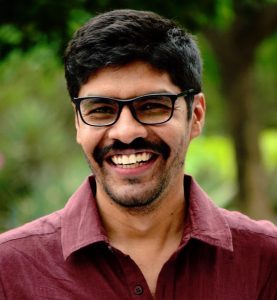 Rohit Azad teaches at Centre for Economic Studies and Planning, Jawaharlal Nehru University, Delhi. He is the author of It’s Not Over: Structural Drivers of the Global Economic Crisis, OUP (2013) and has co-edited A Quantum Leap in the Wrong Direction, Orient BlackSwan (2019). His areas of interest are climate change, macroeconomics, growth and development, political economy, monetary theory and policy. He has twice been a Fulbright scholar at University of Massachusetts, Amherst and the New School of Social Research, New York respectively.
Rohit Azad teaches at Centre for Economic Studies and Planning, Jawaharlal Nehru University, Delhi. He is the author of It’s Not Over: Structural Drivers of the Global Economic Crisis, OUP (2013) and has co-edited A Quantum Leap in the Wrong Direction, Orient BlackSwan (2019). His areas of interest are climate change, macroeconomics, growth and development, political economy, monetary theory and policy. He has twice been a Fulbright scholar at University of Massachusetts, Amherst and the New School of Social Research, New York respectively.
Sbusisiwe Sibeko
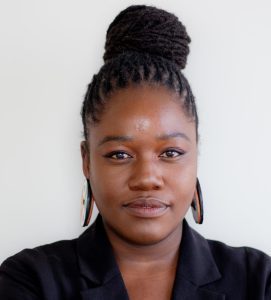 Busi Sibeko is an economist and researcher. She holds a Bachelor of Science in Economics from Duke University and a Masters in the Political Economy of Development from SOAS, University of London. She was previously at the Institute for Economic Justice where her research focus was macroeconomic policy, including participatory feminist budgeting. She was the co-Chair of the Budget Justice Coalition which is comprised of 14+ civil society organisations. She also provided research support to the labour constituency. She authored The Cost Austerity: Lessons for South Africa and is a co-author of A fiscal stimulus for South Africa. In 2020, Busi was featured in the roundtable series of renowned economists on Rebirthing the Global Economy to Deliver Sustainable Development by the United Nations Secretary General. She considers herself a feminist political economist in training and is determined to be a part of unwinding structural injustice.
Busi Sibeko is an economist and researcher. She holds a Bachelor of Science in Economics from Duke University and a Masters in the Political Economy of Development from SOAS, University of London. She was previously at the Institute for Economic Justice where her research focus was macroeconomic policy, including participatory feminist budgeting. She was the co-Chair of the Budget Justice Coalition which is comprised of 14+ civil society organisations. She also provided research support to the labour constituency. She authored The Cost Austerity: Lessons for South Africa and is a co-author of A fiscal stimulus for South Africa. In 2020, Busi was featured in the roundtable series of renowned economists on Rebirthing the Global Economy to Deliver Sustainable Development by the United Nations Secretary General. She considers herself a feminist political economist in training and is determined to be a part of unwinding structural injustice.Sira Nukulkit
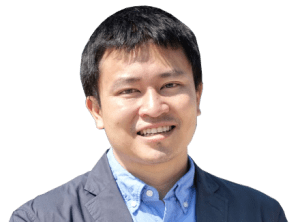
Surajit Mazumdar
 Surajit Mazumdar is Professor of Economics at the Centre for Economic Studies and Planning (CESP), Jawaharlal Nehru University. During a 28-year career, he has also been on the faculty at Ambedkar University Delhi (AUD), Institute for Studies in Industrial Development (ISID), New Delhi and Hindu College, University of Delhi. His research has focused on the Indian corporate sector, Indian industrialization and the impact of globalization on the Indian economy.
Surajit Mazumdar is Professor of Economics at the Centre for Economic Studies and Planning (CESP), Jawaharlal Nehru University. During a 28-year career, he has also been on the faculty at Ambedkar University Delhi (AUD), Institute for Studies in Industrial Development (ISID), New Delhi and Hindu College, University of Delhi. His research has focused on the Indian corporate sector, Indian industrialization and the impact of globalization on the Indian economy.
Vikas Rawal
 Vikas Rawal is Professor of Economics at Jawaharlal Nehru University. His research has mainly focused on agrarian issues, food security and employment. He has conducted field-based research in many states of India. He has also worked on global issues related to agriculture and food. He was the lead author of The Global Economy of Pulses published in 2019 by the Food and Agriculture Organization of the United Nations (FAO). He recently co-edited (with Jayati Ghosh and C P Chandrasekhar) an IDEAs volume titled When Governments Fail (Tulika, 2021).
Vikas Rawal is Professor of Economics at Jawaharlal Nehru University. His research has mainly focused on agrarian issues, food security and employment. He has conducted field-based research in many states of India. He has also worked on global issues related to agriculture and food. He was the lead author of The Global Economy of Pulses published in 2019 by the Food and Agriculture Organization of the United Nations (FAO). He recently co-edited (with Jayati Ghosh and C P Chandrasekhar) an IDEAs volume titled When Governments Fail (Tulika, 2021).
Wei Zhang
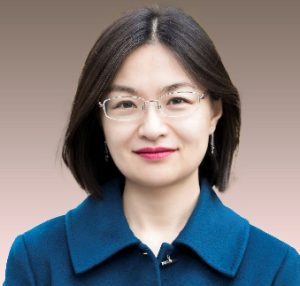 Wei Zhang, PhD, received her doctoral degree in economics from the University of Massachusetts–Amherst. She is currently an associate professor at the School of Marxism, Tsinghua University, China. Her research and teaching interests include political economics, health and health policies, and socioeconomic inequalities. She publishes research articles in journals such as American Journal of Public Health, Journal of Agrarian Change, China Quarterly, International Journal of Health Services, Critical Social Policy, International Critical Thought, Monthly Review, and Critical Public Health.
Wei Zhang, PhD, received her doctoral degree in economics from the University of Massachusetts–Amherst. She is currently an associate professor at the School of Marxism, Tsinghua University, China. Her research and teaching interests include political economics, health and health policies, and socioeconomic inequalities. She publishes research articles in journals such as American Journal of Public Health, Journal of Agrarian Change, China Quarterly, International Journal of Health Services, Critical Social Policy, International Critical Thought, Monthly Review, and Critical Public Health.
Yong-Yoon
 Yong Yoon is an Associate Professor and Deputy Dean in the Faculty of Economics at Chulalongkorn University, Thailand. He is interested in the economic modeling of choice, family structure (ageing), labor economics (informal work/employment, gender-wage gap), international economics, the Korean economy, and data science (ML and AI, as well as quantum econometrics for optimization). He is currently an Associate Editor for the Southeast Asian Journal of Economics and Director of Korean Studies at Chulalongkorn University. Yong Yoon received his PhD in economics from Seoul National University, Korea.
Yong Yoon is an Associate Professor and Deputy Dean in the Faculty of Economics at Chulalongkorn University, Thailand. He is interested in the economic modeling of choice, family structure (ageing), labor economics (informal work/employment, gender-wage gap), international economics, the Korean economy, and data science (ML and AI, as well as quantum econometrics for optimization). He is currently an Associate Editor for the Southeast Asian Journal of Economics and Director of Korean Studies at Chulalongkorn University. Yong Yoon received his PhD in economics from Seoul National University, Korea.
